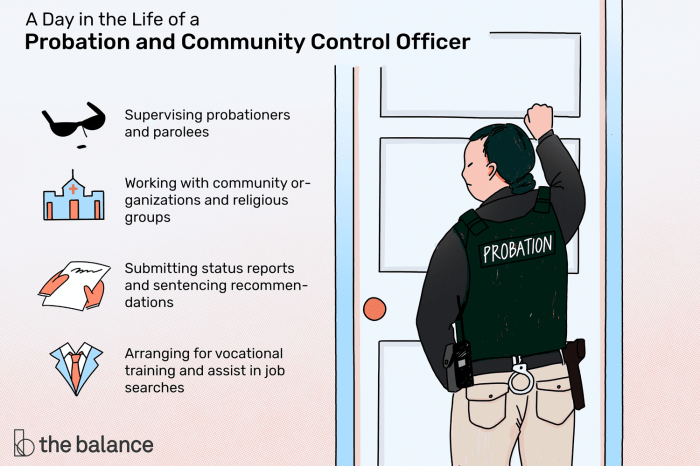What do private probation agencies require of the probationers – Private probation agencies play a significant role in the criminal justice system, providing supervision and support to probationers. They impose various obligations and responsibilities on probationers, aiming to ensure compliance with court orders and promote positive change. This article explores what private probation agencies require of probationers, including supervision methods, treatment programs, and collaboration efforts.
Obligations and Responsibilities of Probationers

Private probation agencies typically require probationers to fulfill a range of obligations and responsibilities. These may include:
- Reporting to a probation officer on a regular basis
- Attending counseling sessions, such as substance abuse treatment or cognitive-behavioral therapy
- Maintaining employment or actively seeking work
- Paying restitution to victims
- Abstaining from alcohol and drug use
Supervision and Monitoring
Private probation agencies use various methods to supervise and monitor probationers. These include:
- Regular meetings with a probation officer
- Home visits
- GPS tracking
- Electronic monitoring
- Drug and alcohol testing
Probation officers play a crucial role in overseeing probationers’ compliance with court orders. They provide guidance, support, and hold probationers accountable for their actions.
Treatment and Rehabilitation Programs, What do private probation agencies require of the probationers
Private probation agencies offer a range of treatment and rehabilitation programs to address the underlying causes of criminal behavior and promote positive change. These programs may include:
- Substance abuse treatment
- Cognitive-behavioral therapy
- Job training
- Education programs
- Mentoring and support groups
These programs are designed to help probationers develop the skills and coping mechanisms necessary to lead successful and crime-free lives.
Collaboration and Partnerships
Private probation agencies collaborate with a variety of organizations to provide comprehensive support to probationers. These partnerships include:
- Law enforcement agencies
- Social service agencies
- Community groups
- Healthcare providers
- Educational institutions
These partnerships help to ensure that probationers have access to the resources and services they need to succeed.
Evaluation and Outcomes
Private probation agencies evaluate the effectiveness of their programs through a variety of methods, including:
- Recidivism rates
- Employment rates
- Program completion rates
- Client satisfaction surveys
Data on these outcomes demonstrates the positive impact of private probation services on reducing crime and recidivism.
FAQ Section: What Do Private Probation Agencies Require Of The Probationers
What are the typical obligations imposed on probationers by private probation agencies?
Common obligations include reporting to a probation officer, attending counseling sessions, maintaining employment, and adhering to specific conduct guidelines.
How do private probation agencies supervise probationers?
Supervision methods include regular meetings with probation officers, GPS tracking, electronic monitoring, and drug testing.
What types of treatment and rehabilitation programs are offered by private probation agencies?
Programs may include substance abuse treatment, cognitive-behavioral therapy, job training, and educational support.


